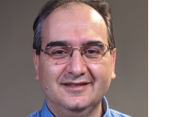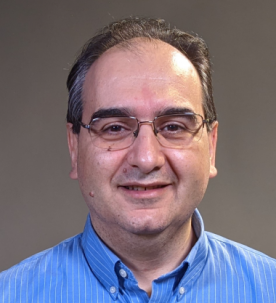Open to All: A Course on Medical Software

A course that tackles the field of medical software from all angles - from the technology to the business management side - is open to all through the online teaching platform Coursera.
 The course, Introduction to Medical Software, is taught primarily by Xenophon Papademetris, professor of Radiology and Biomedical Imaging, and Biomedical Engineering. It also features lectures from course co-organizers Drs. Ayesha Quraishi and Greg Licholai from the Yale School of Management on business and management issues, as well as guest lectures from Profs. Mariam Aboian, Nicha Dvornek and John Onofrey from the department of Radiology and Biomedical Imaging on topics such as clinical imaging and machine learning. The course derives from Medical Software Design, a class that Papademetris has taught at Yale over the past five years.
The course, Introduction to Medical Software, is taught primarily by Xenophon Papademetris, professor of Radiology and Biomedical Imaging, and Biomedical Engineering. It also features lectures from course co-organizers Drs. Ayesha Quraishi and Greg Licholai from the Yale School of Management on business and management issues, as well as guest lectures from Profs. Mariam Aboian, Nicha Dvornek and John Onofrey from the department of Radiology and Biomedical Imaging on topics such as clinical imaging and machine learning. The course derives from Medical Software Design, a class that Papademetris has taught at Yale over the past five years.
“Our goal was to present a broad overview of the field of medical software,” Papademetris said. “We’ve found that interest in the topic has increased significantly in recent years, and we wanted to be able to offer the course to as many people as possible.”
The class consists of 12 "weeks" of material (74 segments that total more than 13 hours of video). In addition, there are interviews with 14 experts from industry and academia. It also features four case studies, each presented by one of four Yale undergraduates, AnMei Little, Alex Chen, Daisha Roberts, and Ellie Gabriel, all of whom helped with the preparation and recording of the class.
Students will learn about the medical device regulatory structure, data privacy and cybersecurity regulations, and key support technologies, such as quality management systems and risk management. The course then takes a detailed look at the medical software life cycle, starting with identifying user needs, mapping these to system requirements and then the process of software design, coding, testing and validation. From there, students will learn about issues related to the use of machine learning techniques in medical applications from both a software engineering and a regulatory perspective. It concludes with a discussion of the business and management issues, focusing on the impact of digital health on modern healthcare and issues related to starting new ventures.
The Yale Poorvu Center for Teaching and Learning, which has worked with numerous Yale professors to create dozens of online courses - including a number of the most popular courses on Coursera – played a key role in getting the online course off the ground. The Poorvu Center promotes equitable and engaged teaching throughout the University, and supports students across the curriculum as they take ownership of their learning. It provides training, consultations, and resources to make teaching and learning more public and collaborative. The class was recorded at the Yale Broadcast Studio.
In addition to the Coursera class, Papademetris, Quraishi and Licholai have a forthcoming textbook, Introduction to Medical Software: Foundations for Digital Health Devices and Diagnostics, which will be published in 2022 by Cambridge University Press. Papademetris said the book came about as a result of teaching the Medical Software class at Yale.
Go here for more information about the course, and how to sign up for it.

